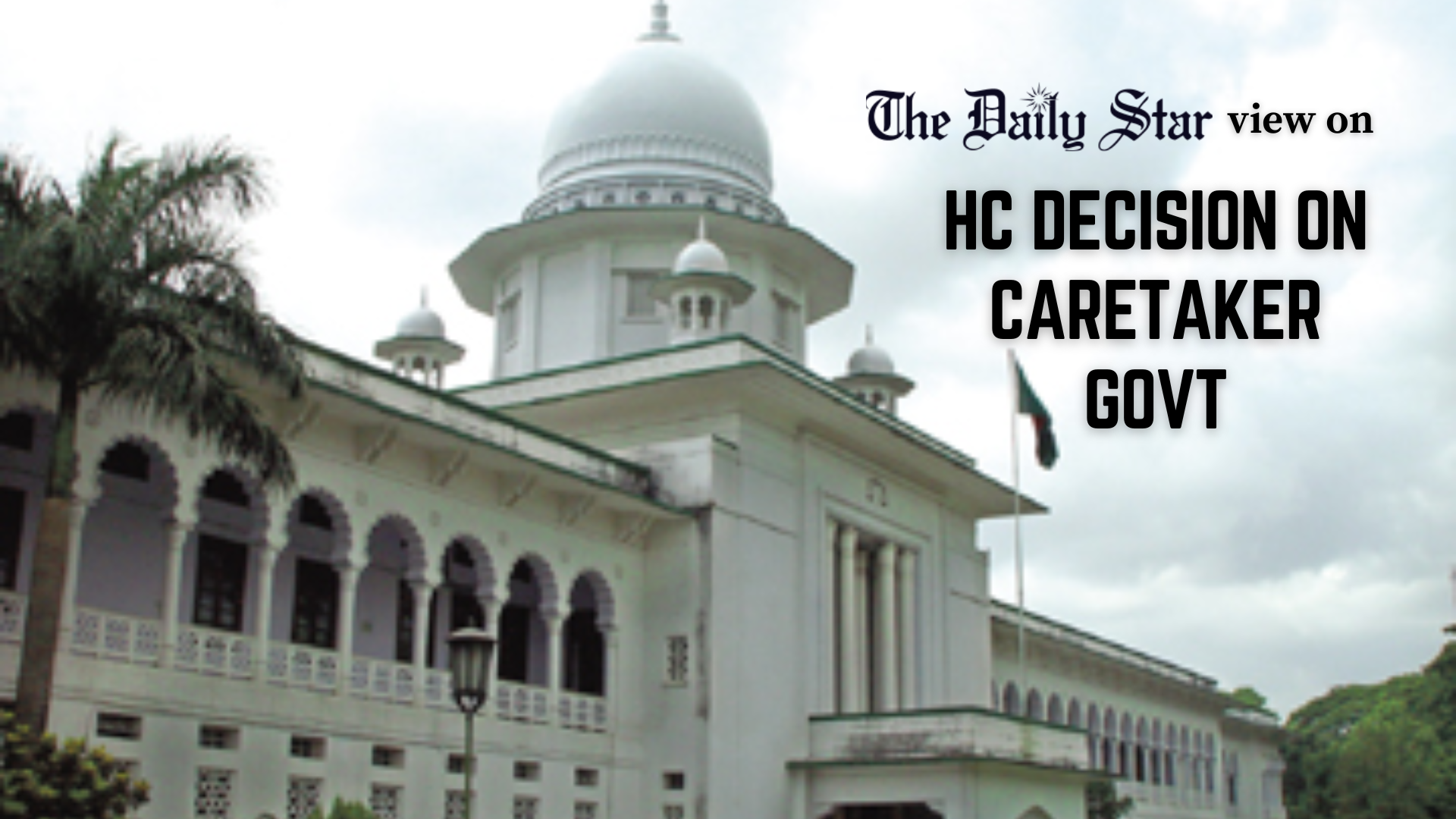Resetting the republic: Caretaker, 15th Amendment, and July Charter

In December 2024, the High Court ruled that the portion of the 15th Amendment that abolished the non-party caretaker government (NCG) was unconstitutional, thereby restoring both the caretaker framework and the referendum mechanism. It published its full reasoning in July. The verdict declared that repealing Article 58A of the constitution (NCG provision) "destroyed the basic structure of [democracy]," struck those repeal sections as void with prospective effect, and revived Article 142's referendum safeguard. That holding sits atop a mountain of record evidence in the judgment itself, which traces how parliament passed the 15th Amendment on June 30, 2011, even as the Appellate Division's short order (May 10, 2011) had allowed two more elections under the caretaker system. Yet, the High Court also declined to void the entire amendment for procedural flaws, limiting its remedy to the parts that injured the constitution's basic features. In practical terms, the legal situation today is this: the NCG's abolition has been judicially undone, referendums are back, and finality awaits the Appellate Division's review.
The implications of this legal development for election-time governance are profound. First, the door is legally open to hold the next parliamentary election under a constitutionally grounded caretaker—a demand born of hard experience with elections in 2014, 2018 and 2024 that were widely criticised or boycotted. The EU Election Expert Mission, EU institutions, and the United States all flagged the 2024 polls as lacking full participation and credibility; those assessments now echo inside the judgment itself. Second, the restoration of referendums raises the bar for any future attempt to dismantle election‑time neutrality: the people must now be asked directly. And third, by grounding its remedy in Bangladesh's basic‑structure jurisprudence, the court has signalled that "free and fair elections" are not merely policy choices but part of the constitutional architecture.
If the law has moved, politics is sprinting to keep up. Last week, the National Consensus Commission (NCC) circulated the final draft of its "July National Charter 2025" among political parties. The charter can be seen as a sprawling blueprint to translate major reform proposals and expectations into operating rules: term limits for the prime minister, a bicameral legislature, an independent appointments architecture—and, crucially, a process to select a chief adviser for the caretaker by a multi‑party committee that can draw in senior judges and use ranked‑choice voting if consensus fails. Yet, the caretaker question remains exquisitely sensitive. Major parties diverge not on whether to restore an NCG, but on who gets decisive voice on adviser selection when initial options stall. The NCC's own account shows a spectrum: one consolidated proposal for a 13‑member cross‑party selection panel; a BNP package that keeps parliament central and excludes the judiciary; Jamaat options that re‑empower the chief justice; and newer entrants pressing for vote‑share‑based formulas. After extensive discussions, the NCC's July Charter outlined a detailed procedure for selecting the chief adviser through a five-member committee consisting of: (i) the prime minister, (ii) the leader of the opposition, (iii) the speaker, (iv) the deputy speaker representing the opposition, and (v) a representative from the second-largest opposition party in parliament. If the committee fails to decide following this process, two judicial members—one from the Appellate Division and one from the High Court Division—would be added. However, the "notes of dissent" indicate that the BNP opposed including senior judges and adopting ranked choice backups, instead advocating parliamentary intervention—an approach critics caution could enable the ruling party to influence the outcome.
These differences are not academic. They go to the heart of our election‑engineering pathology since 2011. After the Appellate Division's 13th Amendment case (Abdul Mannan Khan vs Government of Bangladesh) prospectively invalidated the caretaker but permitted the next two elections under it, parliament moved ahead of the full judgment and erased the NCG entirely. The results—boycotts, disputed administrations, and eventually the student‑led July–August 2024 uprising—are now part of the judicial record and contemporary reporting alike.
So, what would it take to get out of this toxic loop and run a genuinely free and fair election? I suggest following three steps immediately. First, lock in a neutral and workable caretaker design with "fail‑safes" that do not return discretion to whoever holds a parliamentary majority. The NCC's ranked‑choice fallback with limited judicial representation is worth keeping because it reduces single-party vetoes; the parliamentary‑override model should be rejected for the same reason. Second, implement the election‑integrity basics before polling day: an empowered, consensus‑appointed Election Commission; enforceable codes for police and administration; public dashboards on results and complaints; and expedited adjudication of election offences. These are not abstract ideals—they track what recent expert missions and observers have urged. Third, legislate a binding timeline. One weakness of the July Charter draft is the absence of an execution calendar; without dates, reform is a moving target.
How far is the reality? To be frank, we are midway. The court has cleared the constitutional obstacles and published its full reasoning. The NCC has delivered a final draft and parties have engaged, but dissent notes—especially on who ultimately decides the chief adviser—could still turn a reform into a new instrument of partisan control. Meanwhile, the interim administration faces pressure to go to the polls even as it confronts violence, party registration controversies, and public fatigue. In this context, the July Charter could serve as a bridge, but only if it becomes legally enforceable and aligned with the court's rulings: its caretaker provisions should be embedded through a constitutional amendment, to be applied when an elected parliament is in session, backed by a legally binding framework (including a referendum where necessary), with implementing laws enacted and institutions activated immediately rather than waiting until after an election.
An enduring lesson runs through our jurisprudence and our streets alike. The Appellate Division's short order in 2011 was a compromise with necessity; it did not license permanent partisan control of elections. The 15th Amendment's caretaker repeal—and the politics built upon it—taught us how quickly public trust erodes when that control returns. The High Court has now reset the constitutional baseline. The July Charter can translate that reset into practice, but only if parties accept constraints on themselves. If they will not, the court's restoration of the referendum gives the electorate a tool to insist. That is the cleanest way out of election engineering: a neutral caretaker chosen by rules no party can rig, an election run by institutions no prime minister can capture, and a timetable no government can move. Anything less risks repeating the last decade under a new name.
Barrister Khan Khalid Adnan is an advocate at the Supreme Court of Bangladesh, fellow at the Chartered Institute of Arbitrators, and head of the chamber at Khan Saifur Rahman and Associates.
Views expressed in this article are the author's own.
Follow The Daily Star Opinion on Facebook for the latest opinions, commentaries and analyses by experts and professionals. To contribute your article or letter to The Daily Star Opinion, see our guidelines for submission.




 For all latest news, follow The Daily Star's Google News channel.
For all latest news, follow The Daily Star's Google News channel. 

Comments